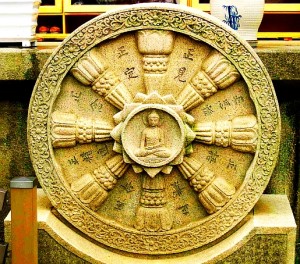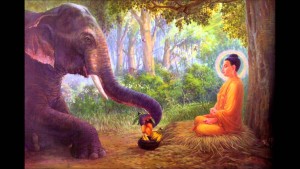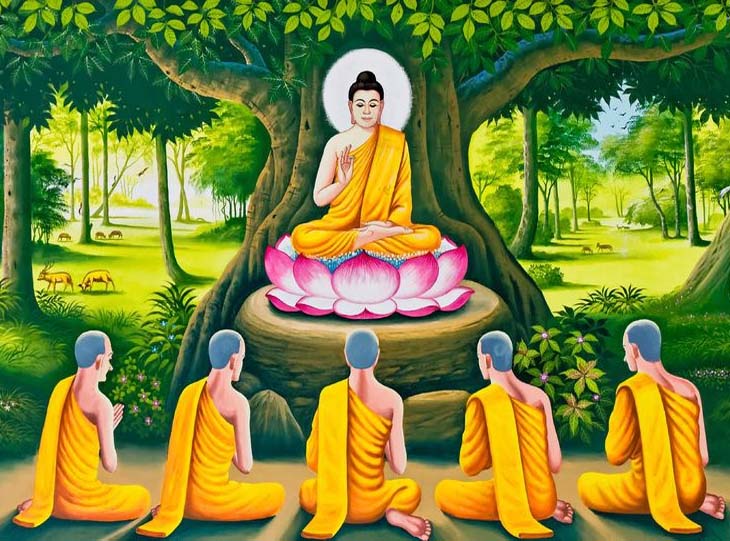KĀLĀMA SUTTA
Buddha’s teaching of Liberal Thinking
(From the Anguttara Nikāya)
 WHAT IS BUDDHA DHAMMA
WHAT IS BUDDHA DHAMMA
The original Pāli term for Dhamma, which literally means that which upholds or sustains (him who acts in conformity with its principles and thus prevents him from falling into woeful states)…the Dhamma is that which really is. It is the Doctrine of Reality. It is a means of deliverance from suffering and deliverance itself. Whether the Buddhas arise or not the Dhamma exists all eternity. It is a Buddha that realizes the Dhamma, which lies hidden from the ignorant eyes of men till He, an Enlightened One comes and compassionately reveals it to the world. This sublime Dhamma is not something apart from oneself. It is purely dependant on oneself and is to be realized by oneself.” (The Buddha and His Teachings, Nārada Maha Thera)
“Buddhism is not strictly a religion in the sense in which that word is commonly understood, for it does not ‘a system of faith and worship’ owe any allegiance to a supernatural God. Buddhism does not demand blind faith from the adherents. Hence mere belief is dethroned and for it is substituted ‘confidence based on knowledge’.” (The Buddha and His Teachings, Nārada Maha Thera)
“The non-aggressive, moral and philosophical system expounded by the Buddha which demands no blind faith from its adherents, expounds no dogmatic creeds, encourages no superstitious rites and ceremonies, but advocates a golden mean that guides a disciple through pure living and pure thinking to the gain of supreme vision and deliverance from all evil, is called the Dhamma and is popularly known as Buddhism.” (Nārada Maha Thera, Buddhism in a Nutshel)
One of the salient features of the Dhamma, the teachings of the Buddha, is the encouragement provided to investigate or explore each and every aspect of it. The word ‘Ehipassiko’ meaning come and see or come and understand vindicates this attitude further. As we see in the modern day world, non-investigative blind belief has driven the mankind into wilderness, which is evident and has resulted in chaos far and wide.
The analytical process preached by the Supreme Teacher, the Buddha, emphasizes the need to put into search every dogma, notion, teaching or practice. In the Kālāma Sutta or Sutra the Enlightened One exactly expounds the same. This piece of article critically demonstrates those aspects vividly.
 Kālāma Sutta
Kālāma Sutta
Once the Blessed One accompanied by a large number of disciples, while passing through the land of Kosala kingdom, arrived in the town of Kēsaputta where Kālāmas lived. It was a small republic.
Knowing about the arrival of the Buddha to their township, Kālāmas were jubilant. They went to the place where the Blessed One was and sat down on one side. So seated the Kālāmas of Kēsaputta spoke thus to the Blessed One:-
“There are O Lord! Some ascetics and recluses who often come to Kēsaputta and who elucidate and exalt their own views, but they break up, crush down, revile and oppose the view of others. And there be another ascetics and recluses, Lord! Who come to Kēsaputta, and they also expound and magnify their own beliefs, but destroy, suppress, despise and set themselves against the beliefs of others.”
“And so, O Lord! We are uncertainty and doubt, knowing not which among these venerable ascetics speaks truth and which falsehood.”
“Good cause, indeed have you Kālāmas to be uncertain, good cause had you to doubt.” Said the Blessed One.
“Truly, upon just occasion has uncertainty and doubt arisen in you.”
“Come, you Kālāmas! Do not go merely by what you hear, do not go merely by what has been handed down from one to another; do not go by what is commonly reported; do not go merely by what is found written in the scriptures; do not go by subtleties or reasoning; do not go by subtleties of logics; do not go merely by considerations based upon mere appearances’ do not go merely by agreeable beliefs and views; do not go merely what looks to be genuine’ do not go merely by word of some ascetics or superior.”
“What, then should we do? What test should we apply?” asked the Kālāmas.
“The test are these,” answered the Blessed One, “ask yourselves, do we know whether; “these things are in salutary, these things are blame-worthy, these things are reprehended by the wise; these things being done or attempted lead to ill-being and to suffering.”
“Kālāmas! You should go further and ask whether the doctrine taught promotes craving, hatred, delusion and violence.”
“This is not enough, Kālāmas! You should go further and see whether the doctrine is not likely to make a man captive of his passions and is not likely to lead him to kill living creatures; take what has not been given to him; go after another’s wife; utter falsehood and cause others to practice like deeds?”
“And finally you should ask: “whether all these do not tend to his ill-being and suffering.”
“Now, Kālāmas! What think you?”
“Do these things tend to man’s ill-being or well-being?”
“To his ill-being, O Lord!” answered the Kālāmas.
“What think you Kālāmas! Are these things salutary or insalutary?”
“They are insalutary, O Lord.”
“Are these things blame-worthy?”
“Blame-worthy, O Lord!”
“Reprehended by the wise or approved by the wise?”
“Reprehended by the wise O, Lord!”
“Being done or attempted, do they lead to ill-being and to suffering?”
“A scripture which teaches this can be accepted as final or infallible?”
“No, Lord!”
“But this, O, Kālāmas! Is just what I have said. What I have said is; “Do not accept anything by mere tradition. Do not accept anything on account of rumours. Do not accept anything just because it accords with your scriptures. Do not accept anything by mere supposition. Do not accept anything by mere inference. Do not accept merely because it agrees with your preconceived notions. Do not accept merely because it seems acceptable. Do not accept anything thinking that the ascetic is respected by us. But when you know for yourselves—these things are immoral, these things are blameworthy, these things are censured by the wise, these things when performed and undertaken, conduce to ruin and sorrow; then indeed do you reject them. When you know yourselves-these things are moral, these things are blameless, these things are praised by the wise, these things are when performed and undertaken, conduce to well-being and happiness-then do you live and act accordingly.”
Therefore what Buddha Dhamma is
“Buddha Dhamma is neither a metaphysical path nor a ritualistic path.
It is neither skeptical nor dogmatic.
It is neither eternalism nor nihilism.
It is neither self-mortification nor self-indulgence.
It is neither pessimism nor optimism but realism.
It is neither absolutely this-worldly nor other-worldly.
It is not extrovert but introvert.
It is not theo-centric but homo-centric.
It is a unique Path of Enlightenment.
(The Buddha and His teachings, by Nārada MahaThera)
Sabbe satta bhavantu sukhitatta!
May all beings be happy and well!

